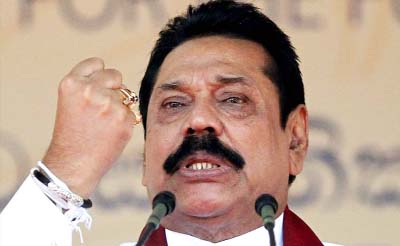
Reuters, Colombo :
A political party backed by Sri Lanka’s former president Mahinda Rajapaksa looks set for a landslide victory in local polls, early results showed on Sunday, potentially undermining the country’s unity government and its reform agenda.
The unexpectedly strong showing could lead to defections away from the centre-left party led by President Maithripala Sirisena, a partner in the country’s coalition government, analysts said, creating instability in the legislature.
The local polls were the first elections since the unity government of Sirisena’s centre-left Sri Lanka Freedom Party (SLFP) and Prime Minister Ranil Wickremesinghe’s centre-right United National Party (UNP) took office in August 2015.
Rajapaksa’s Sri Lanka Podujana Peramuna (SLPP), a party formed by breakaway members of Sirisena’ party, has secured 97 local bodies out of results for 139 councils so far released as at 0650 GMT. The UNP took control of 18 councils and SLFP six.
Results for another 201 local bodies are yet to be released. The long-delayed election comes after the councils were dissolved over two years ago after their tenure ended.
“Rajapaksa’s electoral performance comes as a surprise and will be problematic for President Sirisena,” Shailesh Kumar, director with political risk consultants Eurasia Group told Reuters.
Dinesh Gunawardena, an opposition legislator and member of SLPP, told reporters in Colombo that the Sirisena “government has lost the people’s mandate and should resign now”.
Rajapaksa, a legislator in the opposition benches, commands the backing of 54 legislators who have defected from Sirisena’s party. The president’s party has 41 legislators and the prime minister’s party commands 106 MPs in the 225-member parliament.
A political party backed by Sri Lanka’s former president Mahinda Rajapaksa looks set for a landslide victory in local polls, early results showed on Sunday, potentially undermining the country’s unity government and its reform agenda.
The unexpectedly strong showing could lead to defections away from the centre-left party led by President Maithripala Sirisena, a partner in the country’s coalition government, analysts said, creating instability in the legislature.
The local polls were the first elections since the unity government of Sirisena’s centre-left Sri Lanka Freedom Party (SLFP) and Prime Minister Ranil Wickremesinghe’s centre-right United National Party (UNP) took office in August 2015.
Rajapaksa’s Sri Lanka Podujana Peramuna (SLPP), a party formed by breakaway members of Sirisena’ party, has secured 97 local bodies out of results for 139 councils so far released as at 0650 GMT. The UNP took control of 18 councils and SLFP six.
Results for another 201 local bodies are yet to be released. The long-delayed election comes after the councils were dissolved over two years ago after their tenure ended.
“Rajapaksa’s electoral performance comes as a surprise and will be problematic for President Sirisena,” Shailesh Kumar, director with political risk consultants Eurasia Group told Reuters.
Dinesh Gunawardena, an opposition legislator and member of SLPP, told reporters in Colombo that the Sirisena “government has lost the people’s mandate and should resign now”.
Rajapaksa, a legislator in the opposition benches, commands the backing of 54 legislators who have defected from Sirisena’s party. The president’s party has 41 legislators and the prime minister’s party commands 106 MPs in the 225-member parliament.

